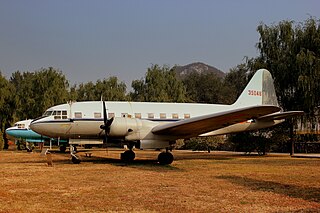
The Yakovlev Yak-42 is a 100/120-seat three-engined mid-range passenger jet developed in the mid 1970s to replace the technically obsolete Tupolev Tu-134. It was the first airliner produced in the Soviet Union to be powered by modern high-bypass turbofan engines.

Wake turbulence is a disturbance in the atmosphere that forms behind an aircraft as it passes through the air. It includes several components, the most significant of which are wingtip vortices and jet-wash, the rapidly moving gases expelled from a jet engine.
Kazakhstan Airlines was an airline from Kazakhstan, serving as national flag carrier of the country from its independence in 1991 until 1996. Following the disaster of the 1996 Charkhi Dadri mid-air collision, Kazakhstan Airlines ceased operations, and its role as flag carrier was transferred to Air Kazakhstan.

Aeroflot Flight 331 was an international passenger flight operated by an Ilyushin Il-62M that crashed about 1 km (0.62 mi) from José Martí International Airport, in Havana, Cuba, on 27 May 1977. The accident occurred after the aircraft hit power lines on its final approach to the airport during poor weather. The aircraft was attempting an emergency landing due to a fire in one of its engines. Only two of the 69 occupants on board survived. The cause of the crash was ruled to be pilot error.

Ust-Kut Airport is an airport in Irkutsk Oblast, Russia which is located 9 km north of Ust-Kut. It services short-haul routes and links the town to Irkutsk and Krasnoyarsk.

The Ilyushin Il-12 is a Soviet twin-engine cargo aircraft, developed in the mid-1940s for small and medium-haul airline routes and as a military transport.
Aviaarktika was a Soviet airline which started operations on 1 September 1930 and was absorbed by Aeroflot on 3 January 1960.

After the dissolution of the Soviet Union in December 1991, its former republics started establishing their own carriers from the corresponding directorates Aeroflot had at these countries, causing the airline to shrink drastically. The fleet reduced from several thousand aircraft to a number slightly over 100 in 1993, helping the former Soviet Union's national airline to improve its accidents and incidents record sharply. The company experienced 42 events between 1990 and 1991 only, and had 41 occurrences in the rest of the decade. Despite this, the three deadliest accidents the airline went through in the decade occurred in the post-Soviet era, leaving a death toll of 257, each one involving more than 50 fatalities.
Talas Airport is an airport serving Talas, the capital of Talas Province (oblast) of Kyrgyzstan. The Russian code for Talas Airport is ТЛС.

Aeroflot Flight 6551 was a scheduled domestic passenger flight on an Ilyushin Il-18B from Baku to Novosibirsk with a stopover in Tashkent that crashed on 11 May 1973 over Semipalatinsk in the Kazakh SSR, killing all 63 people aboard.

Aeroflot Flight N-528 was a regular commercial flight from Odesa to Berdyansk that crashed at 11:22 local time while attempting to land in poor weather conditions.

Aeroflot Flight 5003 was a scheduled passenger flight from Tashkent to Mineralnye Vody with a stopover in Nukus; the Ilyushin 18V operating the route on 15 February 1977 crashed near the district of Mineralnye Vody while climbing after a missed approach. Of the 98 people on board, 77 perished in the crash.

Aeroflot Flight 343 was a passenger flight from Moscow-Sheremetyevo Airport to Jorge Chávez International Airport, on a stopover at Luxembourg-Findel International Airport, that veered off the runway on 29 September 1982, fatally injuring seven occupants. The Ilyushin Il-62M operating the flight suffered a mechanical failure.

Aeroflot Flight 1080 was a Soviet domestic passenger flight from Sverdlovsk, Russia, to Dzhambul, Kazakhstan, that crashed at night shortly after takeoff on 7 October 1978. All 38 passengers and crew were killed in the crash which occurred when one of the engines failed due to icing during initial climb out. At the time, the crash was the second worst in the history of the Yakovlev Yak-40, which had entered operational service with Aeroflot just ten years prior.

Aeroflot Flight U-45 was a passenger flight operated by an Ilyushin Il-18 that crashed during the approach to Samarkand on Friday, 6 February 1970, resulting in the death of 92 of the 106 people on board. An investigation revealed the aircraft went below the minimum obstacle clearance altitude (MOCA) during approach to Samarkand International Airport.

On 12 October 1948, an Aeroflot Ilyushin Il-12 crashed during a scheduled flight from Baku Airport to Tbilisi Airport. All 10 people aboard the aircraft died.

On October 23, 1959, an Ilyushin Il-14 operating as Aeroflot Flight 200 crashed while attempting to land at Vnukovo Airport near Moscow, Moscow Oblast, Russian SFSR, USSR. After being delayed due to bad weather, the aircraft attempted to touch down around 22:00 but crashed approximately 1,400 meters short of the runway after striking trees. Bad weather and pilot error contributed to the crash.















